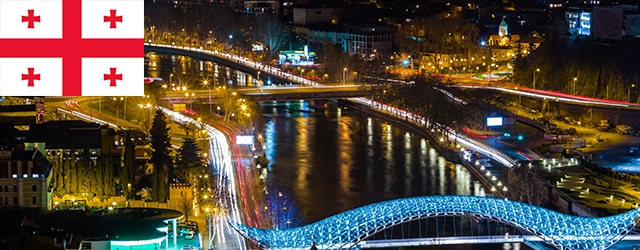
IN THE SHADOW OF THE BEAR
The global financial crisis and several factors peculiar to Georgia have affected foreign direct investment inflows, but investors willing to deal with tensions and risks will find opportunities.
Georgia has not come close to matching its 2007 level of foreign direct investment, which exceeded $2 billion. After some recovery to 2011, inflows dropped again in 2012 and have not recovered even to 2011 levels. In the first two quarters of 2014, they tallied $415.8 million, compared with $460.2 million for the same period in 2013.
Undoubtedly, FDI levels suffered after 2007 because of the financial crisis, and tensions with Russia exacerbate the risks.Georgia and Russia fought a five-day war in August 2008, ostensibly over South Ossetia and Abkhazia, which had declared their independence in 1991 and 1992, respectively. In 2008 hostilities between the two states and Georgia led to Russian intervention. Tensions continue today. Russian troops remain on the border but are actually moving it forward. “We call it the so-called crawling occupation,” explains Irina Guruli, program manager at the Economic Policy Research Center in Tbilisi. “They are moving the border forward, especially in South Ossetia.”
In another move viewed as threatening, Russia signed an agreement with Abkhazia in November to coordinate foreign, defense, economic and social policies and create a joint military unit. In effect, Russia will occupy Abkhazia and perhaps extend the same arrangement to South Ossetia. Tensions had already escalated as a result of the Crimea crisis, and taken together, these factors mean continued nervousness over Russian intentions.
Georgia’s pro-Western leanings are evident in everything from office rents to international affiliations and military actions. Many Tbilisi rents are denominated in US dollars, and it plans to join the European Union and the North Atlantic Treaty Organization. Georgian troops serve in Afghanistan, and it recently agreed to receive three inmates from the Guantanamo Bay prison as part of the US plan to close the facility.
National politics also enter the equation, explains Alexander Benard, COO at Singapore-based private equity firm Schulze Global Investments, which opened its Tbilisi office two years ago. When the Georgian Dream coalition assumed power in 2012, some investors waited to see how it would operate, compared with the outgoing government. “Then most people realized this new government is just as pro-business, just as pro-FDI.”
Georgia has numerous advantages. Benard cites a solid banking sector, a favorable tax regime, energy resources, its location between Asia, the Middle East and Europe, direct access to the Black Sea for shipping, and other benefits. “You don’t have to worry about corruption,” he says. “That is sort of night and day compared with Azerbaijan—where you have to pay a bribe if you want to check out of your hotel room.”
The targets of the top three sources of FDI underscore Georgia’s opportunities: Investments by Dutch companies include energy, manufacturing, transport and communications; those by Azerbaijani companies include transport and communications; and those by companies from Luxembourg include real estate, manufacturing and agriculture.
VITAL STATISTICS |
|---|
|
Location: Southwest Asia |
|
Neighbors: Russia, Turkey, Armenia, Azerbaijan |
|
Capital city: Tbilisi |
|
Population: 4.5 million |
|
Official language: Georgian |
|
GDP per capita (2014, est): $3,643 |
|
GDP growth (2013): 3.2% |
|
Inflation (2013): -0.5% |
|
Currency: Lari |
|
Investment promotion agency: Georgian National Investments Agency wwwinvestingeorgia.org |
|
Investment incentives available? Yes: Free Industrial Zones, and under certain circumstances a Special Trade Company can be set up |
|
Ease of Doing Business rank: 15 |
|
Corruption Perceptions Index rank: 50 |
|
Political risk: Tensions in the ruling Georgian |
|
Security risk: Georgia’s application for admission to the North Atlantic Treaty Organization (currently under consideration) may be a double-edged sword. NATO membership would mean greater security but could antagonize Russia. Both breakaway provinces border on Russia. |
PROS |
|---|
|
Clear Western orientation |
|
Shifting reliance for natural gas supplies |
|
Simplified tax regime |
|
Ranks No. 1 in the region in the |
|
No payroll, social insurance, capital gains or wealth taxes |
|
Numerous trade and tax treaties |
CONS |
|---|
|
Continuing tension with Russia |
|
Small population works against economies of scale, |
|
Cliquish aspect in business, so while a joint-venture partner is not mandatory, it may be advisable |
Sources: International Monetary Fund; National Statistics Office of Georgia; Transparency International; World Bank; GFMag.com Country Economic Reports
For more information on Georgia, check out our Country Economic Reports.



